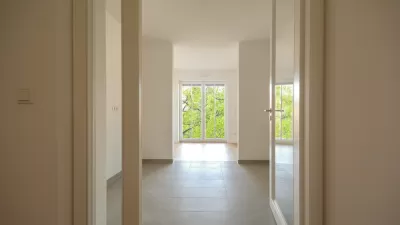Is Airbnb to blame for rising house prices? This article by Leigh Stewart from Tranio.com investigates how easy money from the collaborative economy could be making homes too expensive for tenants and genuine buyers.

There's an elephant in the room and it's got a well-oiled PR machine, filled with heart-warming stories of near-destitute Cuban women who now have enough money to keep their home—thanks to Airbnb. In this new market, hosts stand to earn ten times the average monthly salary for just one booking! In real terms, that's $250 per booking versus $23 per month. It's no wonder this brainchild of Brian Cheskey and Lester Holt has been valued at $25.5 billion: it hasn't just transformed the accommodation market, it's actually bringing capitalism to Cuba one American tourist at a time, something U.S. foreign policy consistently failed to do for decades.
Airbnb is undeniably a fantastic service—it's efficient, user-friendly, and easy on the wallet. For homeowners and long-term tenants, it's an excellent way to pick up some extra money to round off the end of the month. At least, that's how it looks from the outside, but the stats say something different, especially in America. Airbnb may be the polished face of "collaborative economics," but it has all the trappings of a lucrative investor niche.
To be fair, Airbnb paints a good picture: investors, property management companies and professional accommodation providers all receive the ubiquitous title of host, only they have multi-listings as opposed to single listings, though even the latter could mean someone with an extra property on their hands. According to Inside Airbnb, an independent provider of non-commercial tools that analyze publicly available information, there are many hosts with multiple listings: Erica in Austin leads the pack with a massive 120 listings, Denis in Los Angeles has 44 listings, and Sea Breeze Vacation Rentals in San Diego offers the full experience in one of their 79 listings. Surely the irony can't be lost on founder Brian Cheskey and his "feel at home" promise? Or can it?
|
U.S. City |
"Top host" by number of listings |
|---|---|
|
Austin |
120 |
|
San Diego |
79 |
|
Boston |
70 |
|
Washington, D.C. |
57 |
|
Nashville |
45 |
|
Los Angeles |
44 |
|
Seattle |
43 |
|
New York City |
39 |
|
Chicago |
36 |
|
San Francisco |
34 |
|
Portland |
32 |
|
Source: Inside Airbnb |
There is indeed an elephant in the room, and it's pretending to be a ballerina—especially if you take a look at the top ten hosts in various American cities. In San Francisco alone, four of the leading providers are anonymous and between the ten of them, they have 233 listings that generate about half a million in revenue each month on average , or a nice $5.9M every year. This fits in nicely with this first-hand account from Ryan Scott, 33, in San Diego. In an interview with Bloomberg, he says his revenue is about half a million USD per year from his 14 listings with a 20 percent profit margin (about $100K).
The American Dream for some
Move south to Los Angeles and you can meet Denis, a medical school graduate with a keen business sense. If you haven't heard of him, it's probably because Denis (like Scott) is not something you talk about at the dinner table: the lovechild of collaborative economics and capitalism. However, with 44 listings on Airbnb, conveniently located in some of L.A.'s most expensive neighborhoods, you have about 16,060 chances every year of being his guest. Thankfully, Denis is cheap: a bed in a shared room will set you back about $24 per night, plus a $15 cleaning charge. In many ways, this young man is the image of the American dream: he saw an opportunity to turn a profit and seized it. Based on Inside Airbnb data and Scott's 20 percent profit margin, Denis could have revenues of nearly $100K per year.
But there are a few thousand people who don't like people like Denis: the hotel industry, authorities and tax collectors, legal experts, neighbors, homebuyers, and tenants (who make up 78.05 percent of local residents [pdf]), especially in Larchmont Village. Here in this tiny neighborhood, between Melrose Avenue and Beverly Boulevard, Denis is king of the hill with nine listings (out of 76) spread over less than a quarter square mile (0.15 square miles, to be precise).
Okay, so maybe Denis is making some enemies along the way, but that doesn't really matter because he has probably paid his way through med school, a worthy enterprise. But with three bunk beds crammed into a small room, this is hardly that warm fuzzy "feel at home" vibe that Airbnb promised, it's a hostel, of which Denis has many. Of course, maybe all this would be fine if America weren't in the throes of a historic housing crisis that upstart services and hosts like Airbnb and Denis are antagonizing. Short-term rentals (STRs) have higher yields than long-term ones, so in popular cities where landlords can guarantee high occupancy rates from tourism, it's a no-brainer.
Currently, 44.8 percent of Airbnb properties in Los Angeles are multi-listings owned by one host that are considered highly available. In simple words, it means that they have been removed from the stock of long-term rentals in a city where less than a quarter of the population are homeowners…
The growing outcry against Airbnb in cities like L.A. shouldn't come as any surprise. Take these rather depressing statistics by the California Housing Partnership Corporation: rents rose by 25 percent between 2000 and 2012 in L.A., but incomes contracted by 9 percent. Nationwide, the picture is just as bleak for major metropolitan areas. According to research by the NYU Furman Centre and Capital One, between 2006 and 2014 the renter population grew by 22 million people, flowing toward major cities. By 2014, New York alone had gained 1.1 million new tenants with a total 5.2 million living in the city centre. With multi-listings and a majority of entire homes with high availability across America on Airbnb, that's a lot of long-term tenants being edged out of the market like the ugly kid at prom.
The effect of Airbnb on this housing crisis is quite novel. First, it depletes the long-term housing stock because any listing that appears on Airbnb year round is effectively a unit that has been removed from the residential market. This effect coincides with the second fall out, "hotelization," described by Dayne Lee of Harvard Law School [pdf] as the following: "As long as a property owner or leaseholder can rent out a room on Airbnb for cheaper than the price of a hotel room, while earning a substantial premium, over the residential or rent-controlled market, there is an overpowering incentive to list each unit on Airbnb […]."
In other words, if you have a house in the right neighborhood, you can have your cake and eat it too: strong price growth, high yields, and reliable occupancy. This is precisely why officials and inhabitants from cities like New York, Los Angeles, San Francisco, and Austin are getting peeved: tourists flock in droves to enjoy the cultural delights on offer, but services like Airbnb exist in the grey zones of law and business, making it near impossible to manage, monitor, or control the use of properties. The repercussions are noticeably stronger in central and gentrifying areas (thinkWilliamsburg, Brooklyn) within easy reach of a vast array of cultural and entertainment options. Larchmont Village, one of the oldest neighborhoods in L.A., and where Denis has nine listings, is an excellent example. It has 76 listings squashed into just half a square mile and an idyllic old school vibe where the main street is lined with bookstores and barbershops.
The potential earnings from Airbnb and its rivals can be eye watering: Erica has 120 listings in Austin with an estimated monthly revenue of $99.5K, not to mention 14 more listings in Nashville. Her profile describes herself as "a full service property management company based out of Austin, Texas. My team and I strive to make every experience a seamless one, no matter where your trip may take you."Erica needs a name change.Although until anyone actually makes these "hosts" disclose their earnings or Anonymous hacks the Airbnb server, we probably won't know exactly how much.
|
U.S. City |
Total listings for top 10 city hosts |
Estimated turnover, USD millions per year |
|---|---|---|
|
San Francisco |
233 |
5.9 |
|
Boston |
286 |
4.8 |
|
Nashville |
224 |
4.3 |
|
New York City |
254 |
3.8 |
|
Seattle |
276 |
3.4 |
|
Los Angeles |
279 |
3.4 |
|
New Orleans |
164 |
3.1 |
|
Washington, D.C. |
268 |
3.0 |
|
Austin |
281 |
2.8 |
|
San Diego |
222 |
2.6 |
|
Source: Tranio.com calculations based on Inside Airbnb data |
Airbnb: an investor's paradise
As a general rule, STRs earn higher yields than long-term accommodations and perform best in high-demand neighborhoods. Good locations ensure higher home values, which also grow in price faster than peripheral markets. Residential construction struggles to keep up with property sales for reasons such as lack of area for development and how long it takes to build. This, in turn, reduces the stock of available housing for sale, making it hard to find a home and even harder to afford one. People entering the job and housing market and especially those in low-paying jobs become tenants because they have no other option.
Hosts like Seamless, who made the top ten in both Washington, D.C. and Boston (57 and 70 listings, respectively), are definitely not helping by catering to affluent segments of the population. According to their profile, they are "a full-service relocation agency [offering] short-term housing options to executives, medical professionals and leisure travelers looking to secure transitional housing in major cities throughout the United States."
Many houses on the rental market nowadays were snapped up by investors during the crisis. In fact, the rental stock in metro areas grew by 18 percent on average nationwide between 2006 and 2014, according to the Furman Center and Capital One. And of course, by offering higher earnings, STRs are far more attractive than long-term rentals, especially using a service like Airbnb that isn't particularly policed. Ralph McLaughlin, chief economist at Trulia, also concurs that investors are an important driver of inventory depletion in the starter and trade-up segments.
Research by Smartasset shows that price-to-rent ratios in Airbnb hotspots overwhelmingly exceed the national average, with the exception of Nashville. However, by Q1 2016, median listing prices for trade-up property (mid-tier housing between starter and luxury homes) in the city were 28.7 percent higher than in Q1 2012 and the inventory 77.9 percent lower according to Trulia research. So even in Nashville, let alone New York, Oakland, San Francisco, and Seattle, the dream of becoming the homeowner host Airbnb wants you to be is getting further out of reach.
|
U.S. City |
Price-to-rent ratio |
Share of multi-listings of total Airbnb stock, % |
|---|---|---|
|
Nashville |
19.14 |
43.4 |
|
National average |
19.21 |
N/A |
|
New Orleans |
21.36 |
48.7 |
|
Chicago |
21.60 |
38.1 |
|
Austin |
23.36 |
28.6 |
|
Boston |
28.62 |
46.5 |
|
Portland |
29.26 |
35.1 |
|
San Diego |
30.27 |
42.2 |
|
Washington, D.C. |
32.02 |
37.8 |
|
Seattle |
35.09 |
35.8 |
|
New York City |
35.65 |
27.0 |
|
Los Angeles |
38.02 |
44.8 |
|
Oakland |
38.50 |
28.1 |
|
San Francisco |
45.88 |
33.3 |
|
Source: Tranio.com calculations based on Inside Airbnb data, smartasset, |
Collaborative economics need a revamp
None of this sounds very much like a "collaborative economy": all the signs point to investor-landlords, decreasing volumes of long-term rental properties and rising home values. Can a company valued at $25.5 billion really hoist the flag of "commerce with compassion"? Especially when they provide a service that alienates the very people they purport to help during a historic housing crisis? There are many who think not and yet, it wouldn't take much to enhance the transparency and crack down on those who abuse the service.
It starts with small things, like banning users with multiple listings and tracking IP addresses to make sure they don't just create several profiles with different names. They could also use AI image recognition technology like Facebook to detect listings for shared beds in hostel dormitories or track host addresses according to residential and zoning laws. Furthermore, an independent agency could be created to collect and aggregate data from Airbnb and rivals so as to adequately measure the extent of investor-hosts and collect unpaid taxes and dues that could go towards developing affordable housing. This would bolster activity in the construction industry, generating jobs and wealth and allowing more residents to buy homes. There are many ways to bring this service closer to the ideals of the collaborative economy but, true to form, capitalism still has the upper hand in this millennial revolution.
Leigh Stewart writes for Tranio.com, which is an international overseas property broker with a dedicated and independent team of journalists and real estate investment experts. Tranio.com publishes daily news, analysis on foreign realty, expert advice, travel and retirement tips, etc.

Planetizen Federal Action Tracker
A weekly monitor of how Trump’s orders and actions are impacting planners and planning in America.

Maui's Vacation Rental Debate Turns Ugly
Verbal attacks, misinformation campaigns and fistfights plague a high-stakes debate to convert thousands of vacation rentals into long-term housing.

San Francisco Suspends Traffic Calming Amidst Record Deaths
Citing “a challenging fiscal landscape,” the city will cease the program on the heels of 42 traffic deaths, including 24 pedestrians.

Amtrak Rolls Out New Orleans to Alabama “Mardi Gras” Train
The new service will operate morning and evening departures between Mobile and New Orleans.

The Subversive Car-Free Guide to Trump's Great American Road Trip
Car-free ways to access Chicagoland’s best tourist attractions.

San Antonio and Austin are Fusing Into one Massive Megaregion
The region spanning the two central Texas cities is growing fast, posing challenges for local infrastructure and water supplies.
Urban Design for Planners 1: Software Tools
This six-course series explores essential urban design concepts using open source software and equips planners with the tools they need to participate fully in the urban design process.
Planning for Universal Design
Learn the tools for implementing Universal Design in planning regulations.
Heyer Gruel & Associates PA
JM Goldson LLC
Custer County Colorado
City of Camden Redevelopment Agency
City of Astoria
Transportation Research & Education Center (TREC) at Portland State University
Jefferson Parish Government
Camden Redevelopment Agency
City of Claremont





























